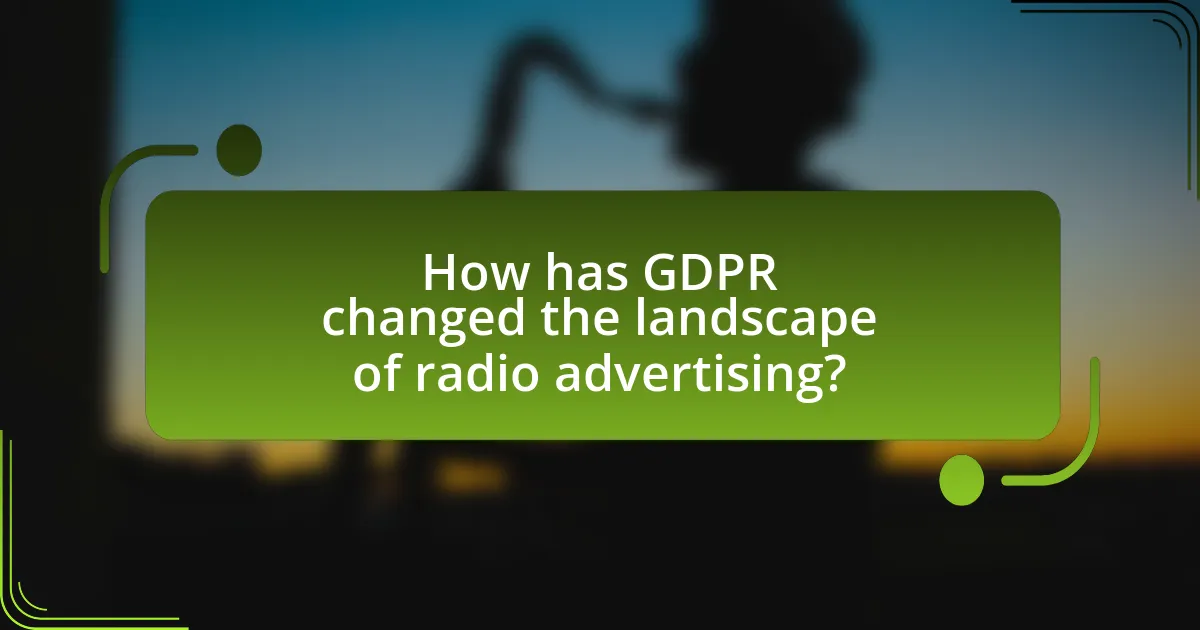The General Data Protection Regulation (GDPR) is a significant data protection law enacted by the European Union in May 2018, which has profound implications for radio advertising practices. This article examines the relevance of GDPR to radio advertising, focusing on its strict requirements for obtaining consent, the definition of personal data, and the principles that govern data protection. It highlights the challenges advertisers face in complying with GDPR, the impact on targeted advertising strategies, and the evolving consumer behavior towards data privacy. Additionally, the article discusses best practices for ensuring compliance, the role of technology in data management, and the future implications of GDPR on the radio advertising landscape.

What is the GDPR and its relevance to radio advertising?
The General Data Protection Regulation (GDPR) is a comprehensive data protection law enacted by the European Union in May 2018, aimed at enhancing individuals’ control over their personal data. Its relevance to radio advertising lies in the regulation’s strict requirements for obtaining consent from individuals before processing their personal data for targeted advertising purposes. Radio advertisers must ensure compliance with GDPR by implementing transparent data collection practices, securing explicit consent from listeners, and providing options for data access and deletion. Non-compliance can result in significant fines, which underscores the importance of adhering to GDPR guidelines in radio advertising strategies.
How does the GDPR define personal data in the context of advertising?
The GDPR defines personal data in the context of advertising as any information that relates to an identified or identifiable natural person. This includes data such as names, identification numbers, location data, and online identifiers that can be used to directly or indirectly identify individuals. The regulation emphasizes that personal data must be processed lawfully, transparently, and for specific purposes, which is crucial for compliance in advertising practices. The GDPR’s definition ensures that advertisers must handle personal data with care, obtaining explicit consent from individuals before using their data for targeted advertising.
What types of data are considered personal under the GDPR?
Personal data under the GDPR includes any information that relates to an identified or identifiable natural person. This encompasses a wide range of data types, such as names, identification numbers, location data, online identifiers, and specific characteristics that can identify an individual. The GDPR defines personal data broadly to ensure comprehensive protection, which is crucial for compliance in sectors like radio advertising, where audience targeting relies heavily on personal information.
How does the definition of personal data impact radio advertising strategies?
The definition of personal data significantly impacts radio advertising strategies by restricting how advertisers can collect and utilize listener information. Under GDPR, personal data is defined as any information that relates to an identified or identifiable individual, which means that radio advertisers must ensure compliance when targeting specific demographics or tailoring content. For instance, if a radio station uses listener data to create personalized ads, it must obtain explicit consent from individuals, limiting the ability to leverage data for broader audience targeting. This regulatory framework has led to a shift towards more generalized advertising strategies, focusing on content that appeals to wider audiences rather than personalized messages, thereby affecting the overall effectiveness and efficiency of radio advertising campaigns.
What are the key principles of the GDPR that affect radio advertising?
The key principles of the GDPR that affect radio advertising include data protection by design and by default, consent, transparency, and the rights of individuals. Data protection by design and by default mandates that radio advertisers incorporate data protection measures into their advertising strategies from the outset. Consent requires that advertisers obtain explicit permission from individuals before processing their personal data for advertising purposes. Transparency obligates advertisers to clearly inform individuals about how their data will be used, including the purpose of the advertising. Lastly, the rights of individuals, such as the right to access, rectify, or erase their data, empower consumers to control their personal information in the context of radio advertising. These principles collectively ensure that radio advertising practices align with the GDPR’s emphasis on protecting individual privacy and data rights.
How do consent requirements influence advertising practices?
Consent requirements significantly influence advertising practices by mandating that advertisers obtain explicit permission from consumers before processing their personal data. This legal obligation, established under regulations like the General Data Protection Regulation (GDPR), compels advertisers to adopt more transparent and ethical data collection methods. For instance, advertisers must clearly inform consumers about how their data will be used, which can lead to a reduction in the volume of data collected and a shift towards more targeted advertising strategies. Research indicates that compliance with consent requirements can enhance consumer trust, as 79% of consumers express a preference for brands that prioritize data privacy. Thus, consent requirements not only reshape the operational framework of advertising but also impact consumer relationships and brand loyalty.
What role does data minimization play in radio advertising campaigns?
Data minimization plays a crucial role in radio advertising campaigns by ensuring that only the necessary data for targeting and measuring effectiveness is collected and used. This principle, mandated by GDPR, requires advertisers to limit data collection to what is essential for their specific advertising objectives, thereby reducing the risk of data breaches and enhancing consumer trust. For instance, under GDPR, companies must justify the need for personal data, which encourages radio advertisers to focus on relevant audience segments rather than collecting excessive information. This approach not only aligns with legal requirements but also fosters a more ethical advertising environment, ultimately benefiting both advertisers and consumers.
What challenges does the GDPR pose for radio advertisers?
The GDPR poses significant challenges for radio advertisers primarily by imposing strict regulations on data collection and processing. Advertisers must ensure that they obtain explicit consent from listeners before collecting personal data, which complicates audience targeting and segmentation strategies. Additionally, the requirement for transparency in data usage means that advertisers must clearly communicate how listener data will be used, potentially limiting the effectiveness of traditional advertising methods. Non-compliance with GDPR can result in hefty fines, further incentivizing advertisers to invest in compliance measures rather than marketing initiatives.
How can radio advertisers ensure compliance with GDPR regulations?
Radio advertisers can ensure compliance with GDPR regulations by obtaining explicit consent from individuals before processing their personal data for advertising purposes. This involves clearly informing individuals about how their data will be used, ensuring that consent is freely given, specific, informed, and unambiguous. Additionally, advertisers must implement robust data protection measures, such as data minimization and secure storage, to safeguard personal information. According to the European Data Protection Board, failure to comply with these principles can result in significant fines, reinforcing the importance of adhering to GDPR standards in advertising practices.
What are the potential penalties for non-compliance in radio advertising?
Potential penalties for non-compliance in radio advertising can include significant fines, legal action, and reputational damage. Under the General Data Protection Regulation (GDPR), organizations can face fines of up to 4% of their annual global turnover or €20 million, whichever is higher, for violations related to data protection and privacy in advertising practices. Additionally, non-compliance may lead to lawsuits from affected individuals or regulatory bodies, further exacerbating financial and reputational risks.

How has GDPR changed the landscape of radio advertising?
GDPR has significantly altered the landscape of radio advertising by imposing stricter regulations on data privacy and consent. Advertisers must now obtain explicit consent from individuals before processing their personal data, which affects how they target audiences and measure campaign effectiveness. For instance, the requirement for transparency in data usage has led to a shift towards more ethical advertising practices, as companies must clearly inform listeners about how their data will be used. This change has resulted in a decrease in the reliance on personal data for targeted advertising, pushing radio advertisers to explore alternative strategies such as contextual advertising and broader demographic targeting. The enforcement of GDPR has also increased the importance of compliance, with potential fines for violations prompting advertisers to invest in data protection measures and training.
What shifts in consumer behavior have been observed since GDPR implementation?
Since the implementation of GDPR, consumers have become more privacy-conscious and selective about sharing personal data. This shift is evidenced by a significant increase in the use of privacy tools, such as ad blockers, with a reported 30% rise in their adoption post-GDPR. Additionally, surveys indicate that 79% of consumers are now more concerned about how their data is used, leading to a decline in trust towards brands that do not prioritize data protection. This heightened awareness has prompted consumers to demand greater transparency and control over their personal information, influencing their purchasing decisions and interactions with brands.
How has consumer trust in radio advertising evolved post-GDPR?
Consumer trust in radio advertising has generally increased post-GDPR due to enhanced data protection and privacy measures. The implementation of GDPR has led to stricter regulations on how consumer data is collected and used, resulting in a more transparent advertising environment. According to a study by the European Commission, 70% of consumers feel more secure knowing that their personal data is protected, which positively influences their perception of advertising channels, including radio. This increased trust is reflected in higher engagement rates and a willingness to respond to radio advertisements, as consumers feel their privacy is respected.
What impact has GDPR had on targeted advertising strategies in radio?
GDPR has significantly restricted targeted advertising strategies in radio by imposing strict regulations on personal data usage. Radio advertisers now face challenges in collecting and processing listener data without explicit consent, which limits their ability to create personalized ad experiences. According to a report by the European Commission, compliance with GDPR has led to a 30% decrease in the effectiveness of targeted advertising campaigns in various media, including radio, as advertisers struggle to access the data needed for precise audience targeting. This regulatory environment has forced radio stations to adapt by focusing more on broad demographic targeting rather than individualized approaches, ultimately impacting their advertising revenue and strategy effectiveness.
How have radio advertising agencies adapted to GDPR requirements?
Radio advertising agencies have adapted to GDPR requirements by implementing stricter data protection measures and enhancing transparency in their advertising practices. These agencies now prioritize obtaining explicit consent from listeners before collecting or processing personal data, ensuring compliance with GDPR’s consent requirements. Additionally, they have revised their data handling policies to include clear privacy notices that inform consumers about how their data will be used, thereby fostering trust and accountability. Furthermore, many agencies have invested in training staff on GDPR compliance and have established data protection officers to oversee adherence to regulations, which is crucial for mitigating risks associated with data breaches and ensuring legal compliance.
What new practices have emerged in data collection and usage?
New practices in data collection and usage include enhanced consent management, data minimization, and the use of privacy-preserving technologies. Enhanced consent management ensures that individuals provide explicit permission for their data to be collected and used, aligning with GDPR requirements. Data minimization involves collecting only the data necessary for specific purposes, reducing the risk of over-collection and potential breaches. Privacy-preserving technologies, such as differential privacy and federated learning, allow organizations to analyze data without compromising individual privacy. These practices have emerged as a direct response to the regulatory landscape shaped by GDPR, which emphasizes user rights and data protection.
How are agencies training staff to comply with GDPR?
Agencies are training staff to comply with GDPR through structured training programs that focus on data protection principles and legal requirements. These programs often include workshops, online courses, and practical scenarios that illustrate the implications of GDPR on daily operations. For instance, many agencies utilize case studies to demonstrate the consequences of non-compliance, reinforcing the importance of adhering to GDPR regulations. Additionally, regular updates and refresher courses are provided to ensure that staff remain informed about any changes in legislation or best practices related to data privacy.

What best practices should radio advertisers follow to comply with GDPR?
Radio advertisers should ensure explicit consent from listeners before collecting personal data, as mandated by GDPR. This involves clearly informing individuals about the data being collected, its purpose, and obtaining their affirmative agreement. Additionally, advertisers must provide an easy way for listeners to withdraw consent at any time.
To further comply, radio advertisers should implement data minimization practices, collecting only the data necessary for their advertising purposes. They must also ensure that any personal data is securely stored and processed, adhering to GDPR’s requirements for data protection and breach notification.
Regular training for staff on GDPR compliance and maintaining transparent privacy policies are also essential best practices. These measures help mitigate risks associated with non-compliance, which can result in significant fines, as evidenced by the enforcement actions taken by data protection authorities across Europe since GDPR’s implementation in 2018.
How can radio advertisers effectively obtain consent from listeners?
Radio advertisers can effectively obtain consent from listeners by implementing clear opt-in mechanisms that comply with GDPR regulations. This involves providing transparent information about data usage and ensuring that listeners actively agree to receive marketing communications. According to GDPR, consent must be freely given, specific, informed, and unambiguous, which means advertisers should use straightforward language and avoid pre-ticked boxes. Research indicates that 88% of consumers are more likely to engage with brands that respect their privacy preferences, highlighting the importance of obtaining explicit consent in building trust and fostering positive listener relationships.
What methods can be used to ensure transparent communication with consumers?
To ensure transparent communication with consumers, organizations can implement clear privacy policies, utilize straightforward language, and provide accessible channels for feedback. Clear privacy policies outline how consumer data is collected, used, and protected, fostering trust. Utilizing straightforward language avoids jargon, making information comprehensible to all consumers. Accessible feedback channels, such as customer service hotlines or online forms, allow consumers to voice concerns and receive timely responses, enhancing transparency. These methods align with GDPR requirements, which emphasize the importance of clear communication regarding data processing practices.
How can advertisers maintain records of consent for compliance purposes?
Advertisers can maintain records of consent for compliance purposes by implementing a systematic approach to document and store consent data securely. This involves utilizing consent management platforms that log the details of consent, including the date, time, method of consent, and the specific purposes for which consent was granted. According to the General Data Protection Regulation (GDPR), maintaining accurate records of consent is essential for demonstrating compliance, as it allows advertisers to provide evidence of consent upon request. Furthermore, regular audits and updates of consent records ensure that they remain current and reflect any changes in consent status, thereby reinforcing compliance with GDPR requirements.
What tools and technologies can assist in GDPR compliance for radio advertising?
Tools and technologies that can assist in GDPR compliance for radio advertising include consent management platforms, data encryption software, and privacy compliance management tools. Consent management platforms, such as OneTrust and TrustArc, enable advertisers to obtain and manage user consent for data processing, ensuring compliance with GDPR requirements. Data encryption software protects personal data during transmission and storage, reducing the risk of data breaches. Privacy compliance management tools, like LogicGate and SAI Global, help organizations assess their compliance status, manage data subject requests, and maintain records of processing activities, which are essential for GDPR adherence. These tools collectively facilitate the implementation of GDPR principles in radio advertising practices.
What role do data management platforms play in compliance efforts?
Data management platforms (DMPs) play a crucial role in compliance efforts by enabling organizations to collect, manage, and analyze consumer data in accordance with regulations like GDPR. DMPs facilitate data governance by ensuring that data collection practices are transparent and that user consent is obtained and documented, which is a fundamental requirement of GDPR. Additionally, DMPs help organizations maintain data accuracy and security, allowing for the proper handling of personal data and minimizing the risk of breaches or non-compliance penalties. By providing tools for data anonymization and segmentation, DMPs further support compliance by allowing businesses to utilize data without compromising individual privacy rights.
How can analytics tools help in understanding consumer data usage?
Analytics tools can significantly enhance the understanding of consumer data usage by providing detailed insights into user behavior and preferences. These tools analyze large datasets to identify patterns, trends, and anomalies in how consumers interact with products and services. For instance, analytics platforms can track metrics such as engagement rates, conversion rates, and user demographics, allowing businesses to tailor their marketing strategies effectively. According to a report by McKinsey, companies that leverage analytics tools can improve their marketing ROI by up to 15-20%, demonstrating the effectiveness of data-driven decision-making in understanding consumer behavior.
What are the future implications of GDPR on radio advertising practices?
The future implications of GDPR on radio advertising practices include stricter data protection measures and increased compliance costs for advertisers. As GDPR mandates explicit consent for personal data usage, radio advertisers will need to ensure that they obtain clear permission from listeners before collecting or utilizing their data for targeted advertising. This shift may lead to a reduction in personalized advertising opportunities, as advertisers may face challenges in gathering consent from a broad audience. Additionally, the potential for significant fines for non-compliance could incentivize radio stations and advertisers to invest in robust data management systems, thereby increasing operational costs. Overall, GDPR will likely push radio advertising towards more transparent and privacy-focused practices, reshaping how advertisers engage with their audience.
How might evolving regulations further impact radio advertising strategies?
Evolving regulations, particularly those related to data privacy like GDPR, significantly impact radio advertising strategies by necessitating greater transparency and consent in data usage. As regulations tighten, advertisers must adapt by ensuring compliance, which may lead to a shift towards more ethical data collection practices and a focus on contextual advertising rather than targeted ads based on personal data. For instance, GDPR mandates that advertisers obtain explicit consent from consumers before processing their data, which can limit the effectiveness of traditional targeted advertising methods. Consequently, radio advertisers may need to invest in broader audience segmentation and content relevance to maintain engagement while adhering to legal requirements.
What trends should advertisers watch for in the post-GDPR landscape?
Advertisers should watch for increased emphasis on data privacy and transparency in the post-GDPR landscape. This shift is driven by heightened consumer awareness and regulatory scrutiny, leading brands to adopt more ethical data practices. According to a survey by the International Association of Privacy Professionals, 70% of consumers are more likely to engage with brands that prioritize data protection. Additionally, advertisers are likely to leverage first-party data more effectively, as reliance on third-party cookies diminishes due to privacy regulations. This trend is supported by a report from eMarketer, which indicates that 60% of marketers plan to increase their investment in first-party data strategies.



